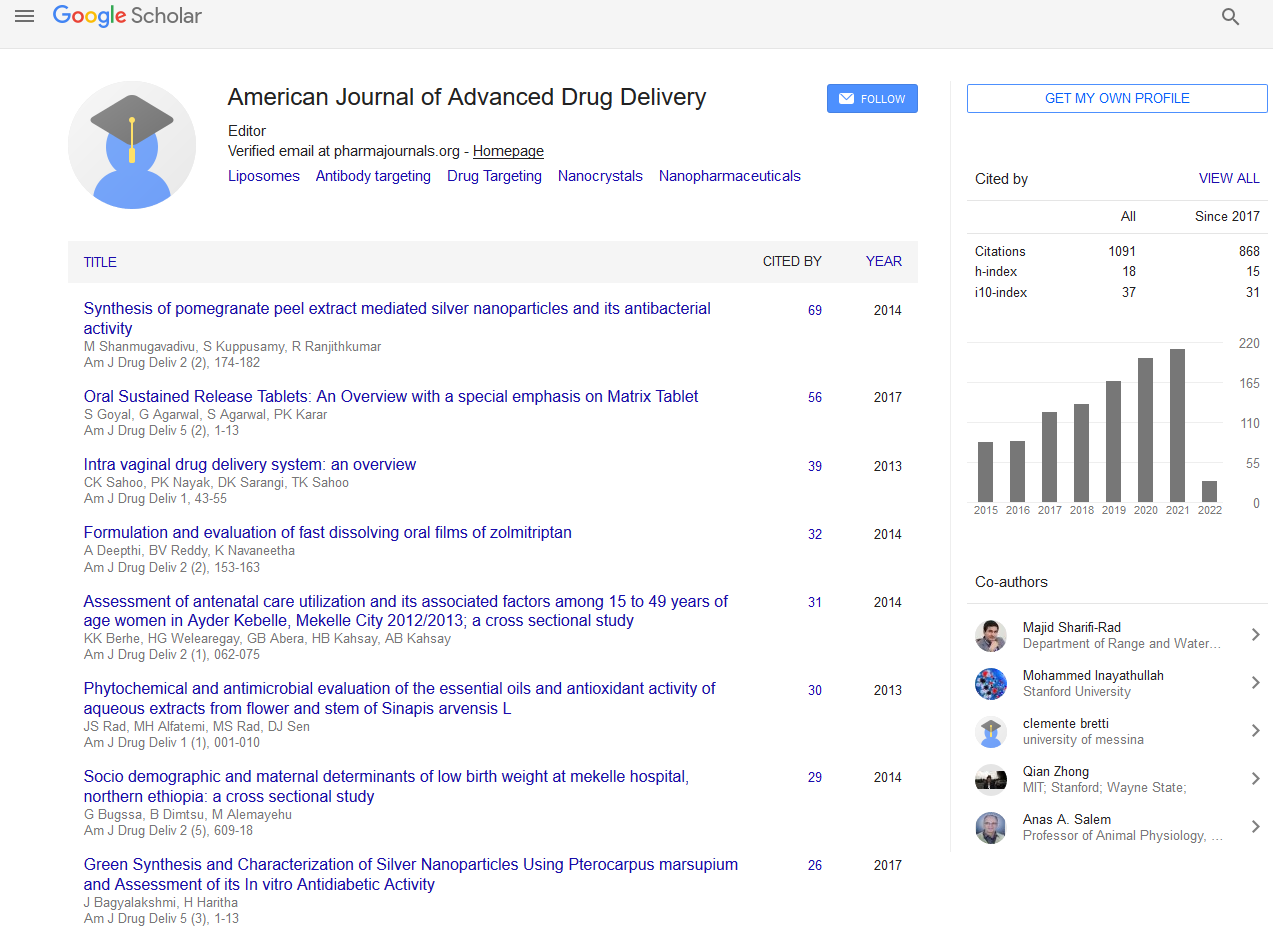Short Communication - (2024) Volume 12, Issue 1
Harnessing the Power of Drug Therapy: Advancements, Challenges, and Future Perspectives
Michael Hindle*
Department of Medical Sciences, California University, USA
*Correspondence:
Michael Hindle,
Department of Medical Sciences, California University,
USA,
Email:
Received: 28-Feb-2024, Manuscript No. IPAAD-24-19928;
Editor assigned: 01-Mar-2024, Pre QC No. IPAAD-24-19928;
Reviewed: 15-Mar-2024, QC No. IPAAD-24-19928;
Revised: 20-Mar-2024, Manuscript No. IPAAD-24-19928;
Published:
27-Mar-2024, DOI: 110.36648/2321-547X.12.1.02
Introduction
Drug therapy, the cornerstone of modern medicine, encompasses
the use of pharmaceutical agents to prevent, alleviate, or cure
disease. From antibiotics to anticancer drugs, drug therapy has
revolutionized healthcare, extending lifespans and improving
quality of life for millions worldwide. This article explores the
multifaceted landscape of drug therapy, highlighting its historical
evolution, therapeutic modalities, challenges, and future
directions. Drug therapy refers to the use of pharmaceutical
agents, including medications and therapeutic substances, to
prevent, treat, alleviate, or cure diseases or medical conditions in
humans or animals. It encompasses a wide range of therapeutic
modalities, including pharmacotherapy, biologic therapies, and
combination therapies, aimed at improving patient outcomes
and quality of life.
Description
Drug therapy involves the systematic administration of drugs, often in accordance with established treatment protocols and guidelines, to address specific health concerns and achieve desired therapeutic effects. The history of drug therapy traces back thousands of years, with ancient civilizations harnessing the medicinal properties of plants and natural substances to treat various ailments. However, it wasn’t until the 20th century that the era of modern drug therapy began, marked by the discovery and development of synthetic drugs such as antibiotics, analgesics, and anti-hypertensives. The advent of pharmacology and medicinal chemistry paved the way for systematic drug discovery and optimization, ushering in an era of targeted therapies and personalized medicine. Drug therapy encompasses a diverse array of therapeutic modalities tailored to the unique needs of individual patients and disease conditions. Pharmacotherapy, the use of medications to treat disease, remains the cornerstone of drug therapy, encompassing a wide range of drug classes such as antimicrobials, antineoplastics, cardiovascular agents, and psychotropics. Additionally, biologic therapies, including monoclonal antibodies, gene therapies, and cell-based therapies, offer targeted approaches to treating diseases such as cancer, autoimmune disorders, and genetic conditions. Moreover, combination therapies, involving the simultaneous use of multiple drugs or modalities, are increasingly utilized to enhance therapeutic efficacy, minimize drug resistance, and improve patient outcomes. Despite the remarkable advancements in drug therapy, several challenges persist, hindering the development and optimization of effective treatments. Drug resistance, fueled by the overuse and misuse of antibiotics and antimicrobials, poses a significant threat to global health, leading to the emergence of multidrug resistant pathogens. Moreover, adverse drug reactions, drug interactions, and variability in patient response underscore the importance of pharmacovigilance and personalized medicine approaches. Additionally, access to essential medications, particularly in low and middle income countries, remains a pressing concern, highlighting the need for equitable distribution and affordability of drugs worldwide [1-4]. Looking ahead, the future of drug therapy holds immense promise for transforming the landscape of healthcare and addressing unmet medical needs. Advances in pharmacogenomics, biomarker-driven therapy, and precision medicine are revolutionizing the way drugs are discovered, developed, and prescribed, enabling tailored treatment regimens based on individual genetic makeup and disease characteristics. Furthermore, emerging technologies such as nanomedicine, gene editing, and artificial intelligence are expanding the frontiers of drug delivery, diagnostics, and therapeutics, offering novel approaches for combating diseases such as cancer, neurodegenerative disorders, and infectious diseases.
Conclusion
In conclusion, drug therapy stands as a cornerstone of modern
medicine, offering hope and healing to millions of patients
worldwide. From ancient remedies to cutting-edge biologic therapies, the evolution of drug therapy reflects the relentless
pursuit of scientific discovery and innovation in healthcare. By
addressing challenges such as drug resistance, adverse effects,
and access disparities, researchers and healthcare professionals
strive to unlock the full potential of drug therapy in improving
patient outcomes and advancing human health. As we stand on
the threshold of unprecedented scientific advancements, the
future of drug therapy holds immense promise for transforming
the trajectory of healthcare and enhancing the quality of life for
generations to come.
Acknowledgement
None.
Conflict Of Interest
The author’s declared that they have no conflict of interest.
References
- Kessler RC, Berglund P, Coulouvrat C (2011) Insomnia and the performance of US workers: Results from the America insomnia survey. Sleep 34(9): 1161-1171.
[Crossref] [Google Scholar]
- Chee CC, Bayon V, Bloch J (2011) Epidemiology of insomnia in France. Rev Epidemiol Sante Publique 59(6): 409-422.
[Crossref] [Google Scholar]
- Morphy H, Dunn F, Lewis M (2007) Epidemiology of insomnia: A longitudinal study in a UK population. Sleep 30(3): 274-280.
[Crossref] [Google Scholar]
- Ohayon MM (2002) Epidemiology of insomnia: What we know and what we still need to learn. Sleep Med Rev 6(2): 97-111.
[Crossref][Google Scholar]
Citation: Hindle M (2024) Harnessing the Power of Drug Therapy: Advancements, Challenges, and Future Perspectives. Am J Adv
Drug Deliv. 12:02.
Copyright: © 2024 Hindle M. This is an open-access article distributed under the terms of the Creative Commons Attribution
License, which permits unrestricted use, distribution, and reproduction in any medium, provided the original author and source
are credited.

